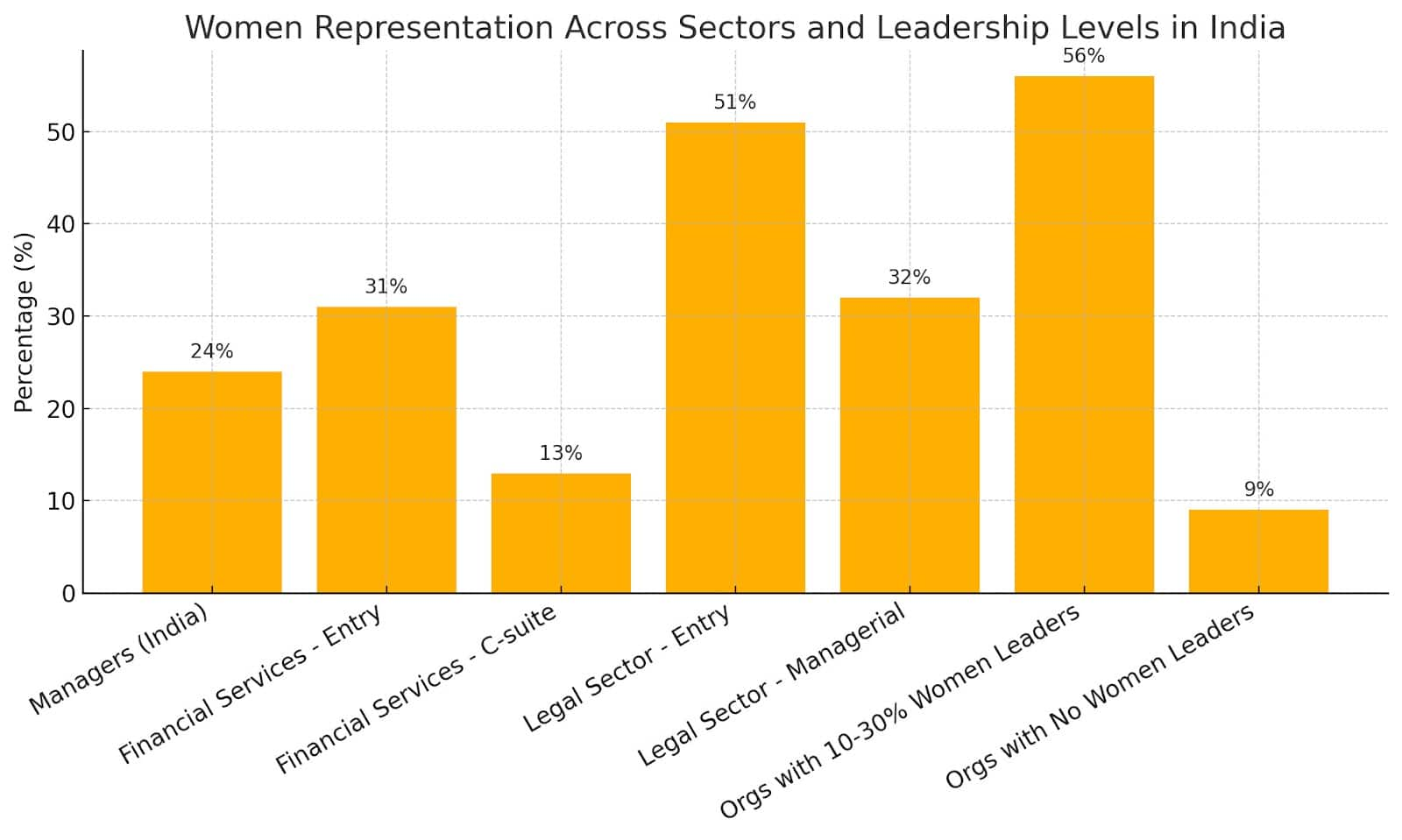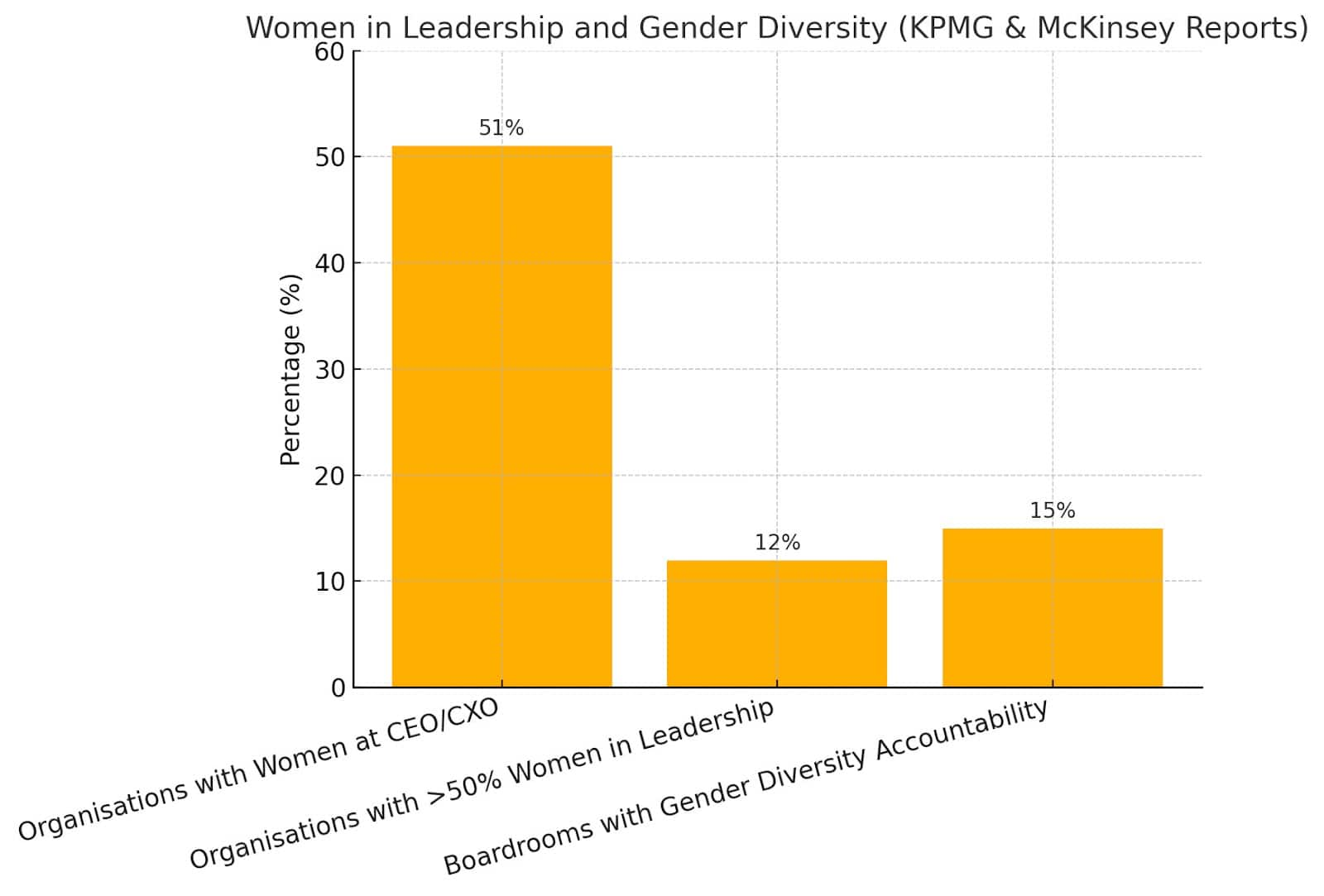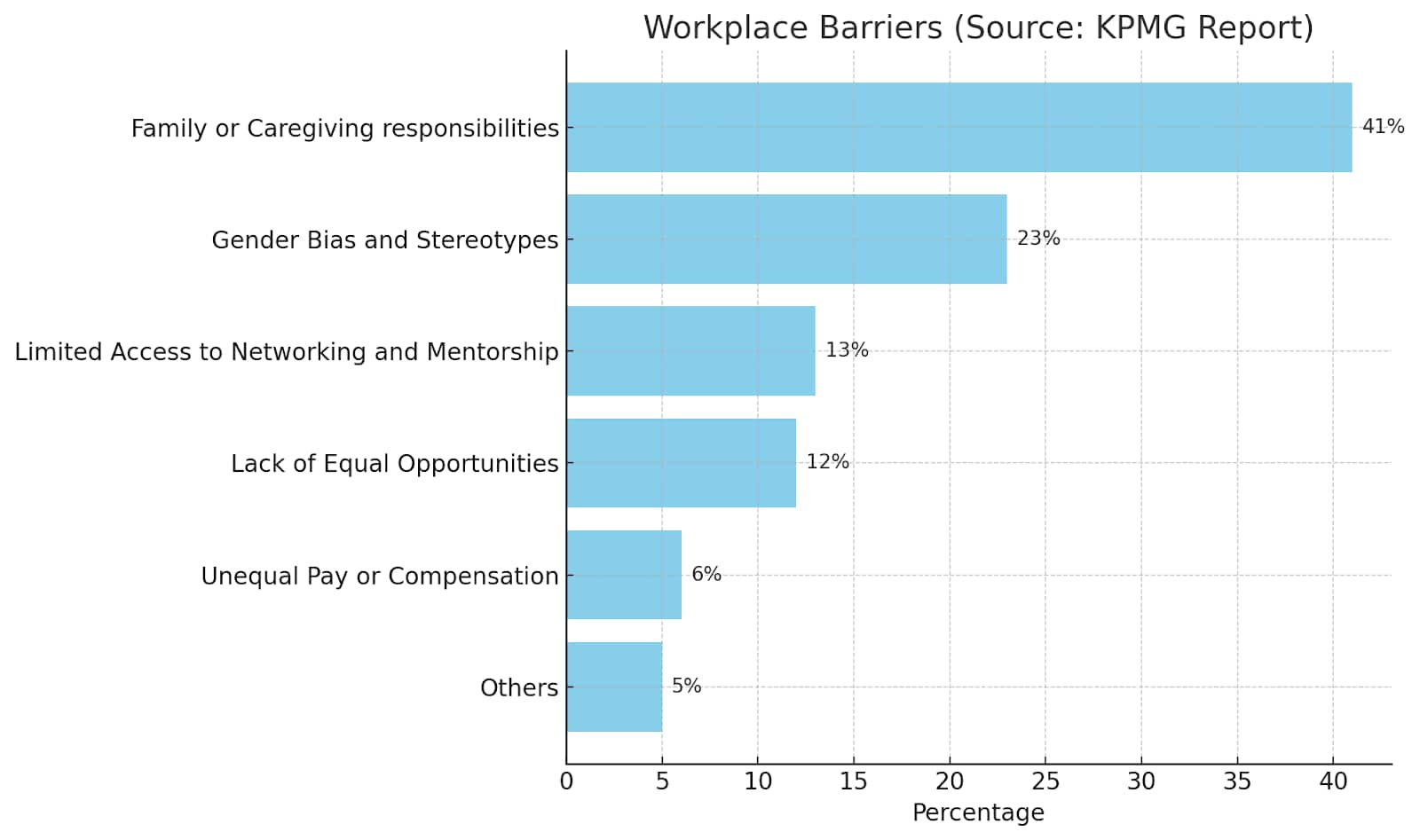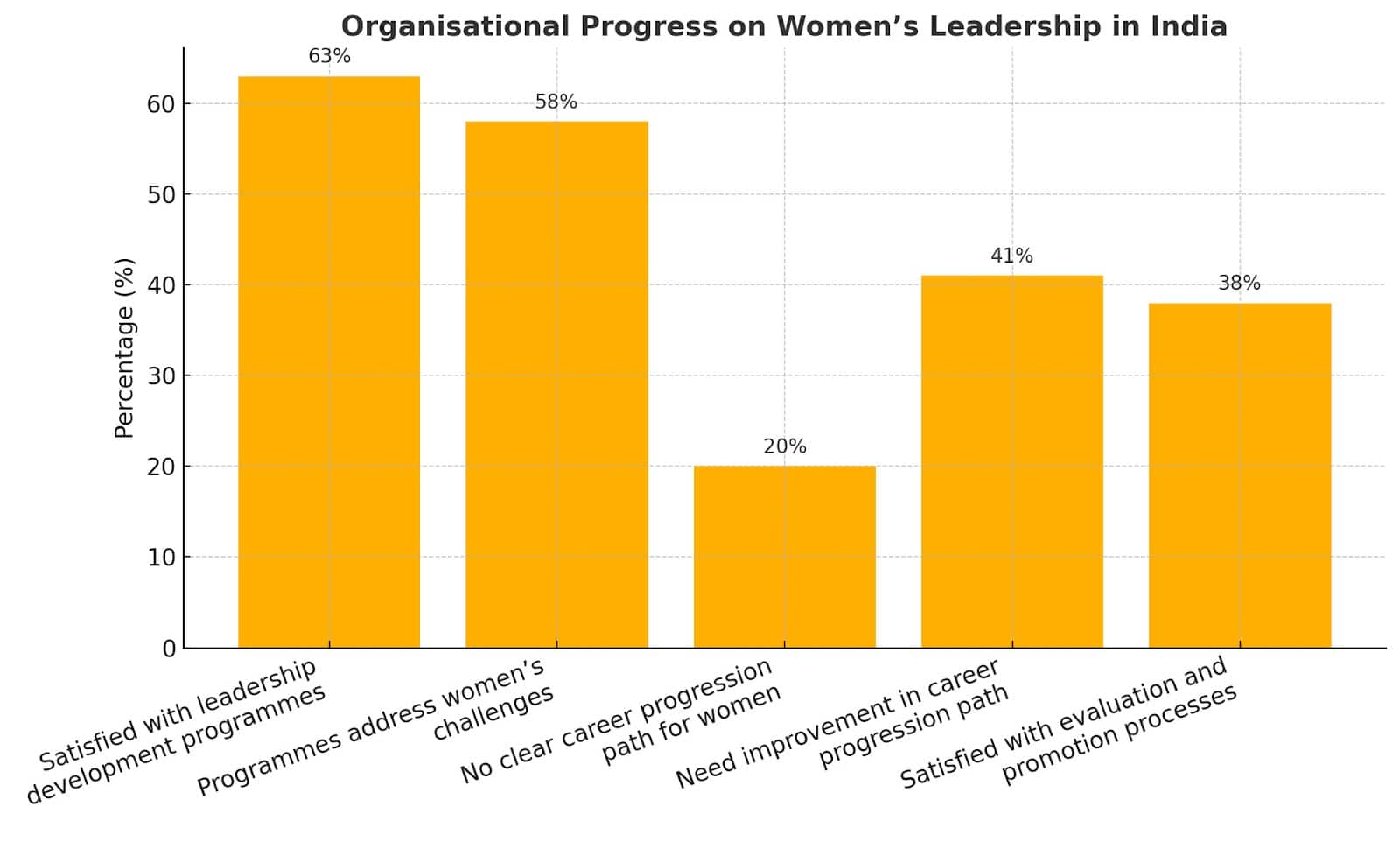Women in the Indian Workspace in 2025
In 2025, India’s workplaces are at an important turning point. On one hand, women make up 48 per cent of university students, showing education is no longer a barrier. On the other hand, this is not fully reflected in the workforce. As per McKinsey’s report: Women in the Workplace in 2025, only 33 per cent of women accounted for entry-level employment, out of which 24 per cent are managers. This gap shows that while India has a good amount of educated women, many are not making it into formal employment or are dropping out early in their careers.
.jpg)
Early Careers
The challenges start at the entry level itself. According to McKinsey’s report, Women in India begin their careers later, entering the workforce at an average age of 39 compared to 32 for men. This late start reduces the number of years they can spend gaining experience and moving up the corporate ladder.
Another challenge is growth. According to KPMG’s report, Women Leadership in Corporate India 2024 report. In 77 per cent of organisations, less than 30 per cent of women hired at entry-level reach leadership positions. This means that many women are unable to reach managerial positions even when they are qualified.
Mid-Level and Managerial Roles
As women move up to managerial roles, these numbers reduce further. McKinsey reports that only 24 per cent of managers in India are women.
In financial services, women make up only 31 per cent of the entry-level, but this fell to just 13 per cent in the C-suite.
In the legal sector, women form 51 per cent of entry-level roles, but only 32 per cent at the managerial or senior levels.

KPMG’s report also states that 56 per cent of the organisations have just 10-30 per cent of women in leadership positions, while nine per cent of the companies have no women leaders at all.
Senior Leadership
At the top of the hierarchy, there are signs of improvement. From the KPMG report, 51 per cent of organisations now have women at the CEO or CXO levels. Moreover, 12 per cent of organisations have more than 50 per cent of women in leadership roles, which seems promising.
However, the overall numbers are still low. For most companies, women remain on staff in boardrooms. The McKinsey report also showcases that only 15 per cent of company boardrooms track gender diversity through accountability metrics, which means progress is not always measured.

Educational Pathways for Women’s Career Growth
Higher education is crucial for women to not only enter the workforce but also to climb up to managerial positions quickly. Degree programmes that not only provide strong academic knowledge but also practical knowledge can be rewarding.
MBA and Other Management Degrees
Pursuing an MBA in disciplines such as Human Resource Management, International Business, Business Analytics, or Finance can open up multiple career opportunities for women. These programmes do not just provide technical knowledge of management concepts but also help in building soft skills like leadership, communication, decision-making, and critical thinking.
MBA programmes also include networking opportunities, internships, and exposure to industry experts, which allow women to build professional connections that are essential for career growth. Specialisations such as Business Analytics or Finance also position women for roles in high-demand industries such as consulting, fintech, and global business strategy. For women aspiring to enter leadership roles, these degrees serve as a strong foundation for moving into managerial and executive roles.
STEM Courses
Technology is the backbone of the modern workplace, and pursuing STEM-focused courses can help women prepare for future careers. Degrees in Information Technology, Computer Science, Data Science or Artificial Intelligence provide a strong foundation in digital skills, which are increasingly in demand across different industries.
With industries adopting automation, machine learning, and data-driven decision-making, women with step qualifications can contribute meaningfully to innovation and product development. These courses can also help women enter traditionally male-dominated fields, paving the way for gender diversity in tech-driven industries.
Certification Courses (CFA, CA, CS, FRM and Others)
Specialised certification such as Chartered Financial Analyst (CFA), Chartered Accountant (CA), Company Secretary (CS) or Financial Risk Manager (FRM) is highly valued by employers. These qualifications are globally recognised and provide knowledge of investment management, taxation, corporate governance, and risk management.
While these courses require dedication and long-term commitment, the return on investment is equally rewarding. Employers often prefer candidates who have these certifications. These ensure better job security, higher earning potential, and credibility in the industry. Women can get a competitive edge over other candidates and can apply for specialised roles in multinational companies, consulting firms, and regulatory bodies.
Online and Hybrid Programmes
For many women professionals, balancing work, personal responsibilities, and education can be challenging. In such cases, online and hybrid programs are excellent alternatives to traditional full-time degrees. Universities and edtech platforms now offer flexible part-time MBAs, executive education, micro-certifications, and skill-focused online modules that can be pursued from anywhere. These programmes are designed to be flexible, allowing women to upskill themselves without putting their professional and personal lives on hold.
Moreover, online and hybrid courses often have affordable tuition fees, interactive learning methods, and networking opportunities with a global peer group. Women can choose specialised programmes in areas such as digital marketing, financial analytics, and project management, ensuring they stay updated with industry trends while maintaining work-life balance.
Women’s Aspirations vs Workplace Barriers
One of the surprising aspects from KPMG is that ambition is not the problem. In fact, 87 per cent of women professionals aspire to be in leadership roles, compared to 78 per cent of men. However, workplace barriers hold them back, the biggest challenges they face, according to the same report by KPMG, are-

This data shows that women’s workplace barriers have more to do with systems and less with women’s motivation to pursue a career.
Retention
While it is true that women are continuing to leave the workforce at higher rates than men, there are some positive signs. According to KPMG, 49 per cent of the companies reported a decrease in women’s dropout rates over the past five years. Policies such as flexible and hybrid work can be the reason.
Organisational Policies
Organisations in India are taking steps, but the progress is uneven.
63 per cent of organisations say they are satisfied with leadership, development programmes, but only 58 per cent believe programmes truly address women’s challenges.
20 per cent of organisations have admitted they do not have a clear career progression path for women, while 41 per cent say they need improvement in this aspect.
Only 38 per cent of professionals are satisfied with the evaluation and promotion processes.

This signifies that while some companies are moving forward, many still lack strong systems to support women’s careers in the long term.
Conclusion
The reports from McKinsey and KPMG make one thing clear: Indian women are educated, ambitious and ready to lead the organisations; however, systematic barriers are holding them back. Companies are required to build clear career paths for women, ensure streamlined evaluation and promotion systems, and support flexible work and family-friendly policies to reduce dropouts.